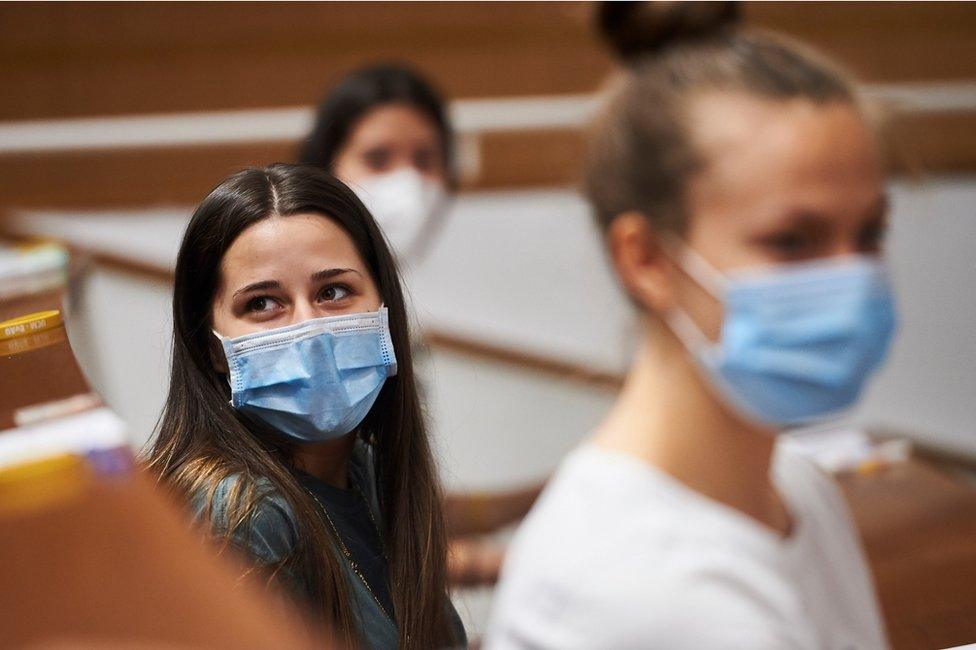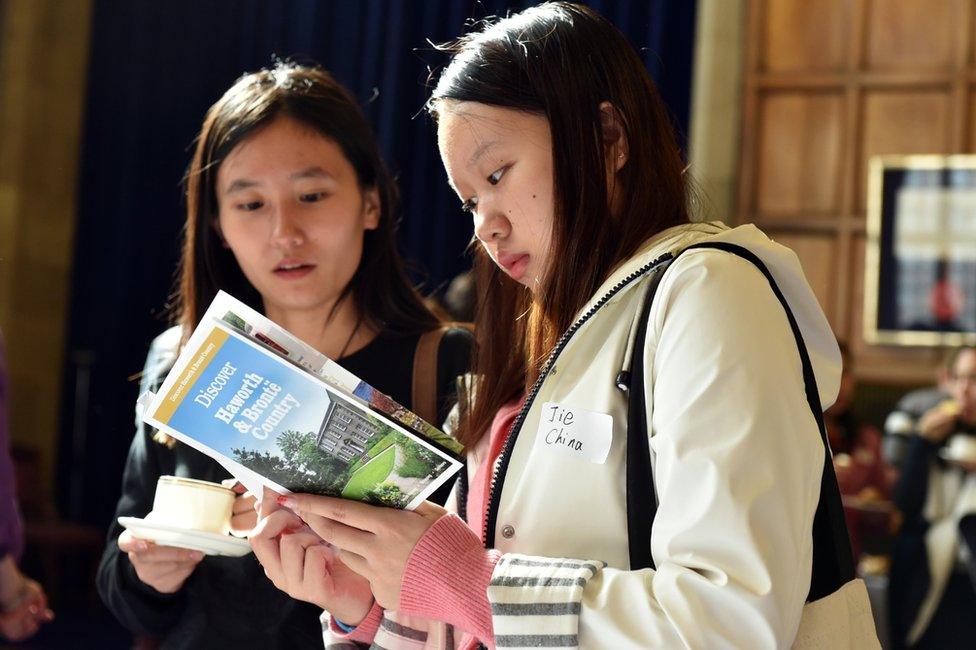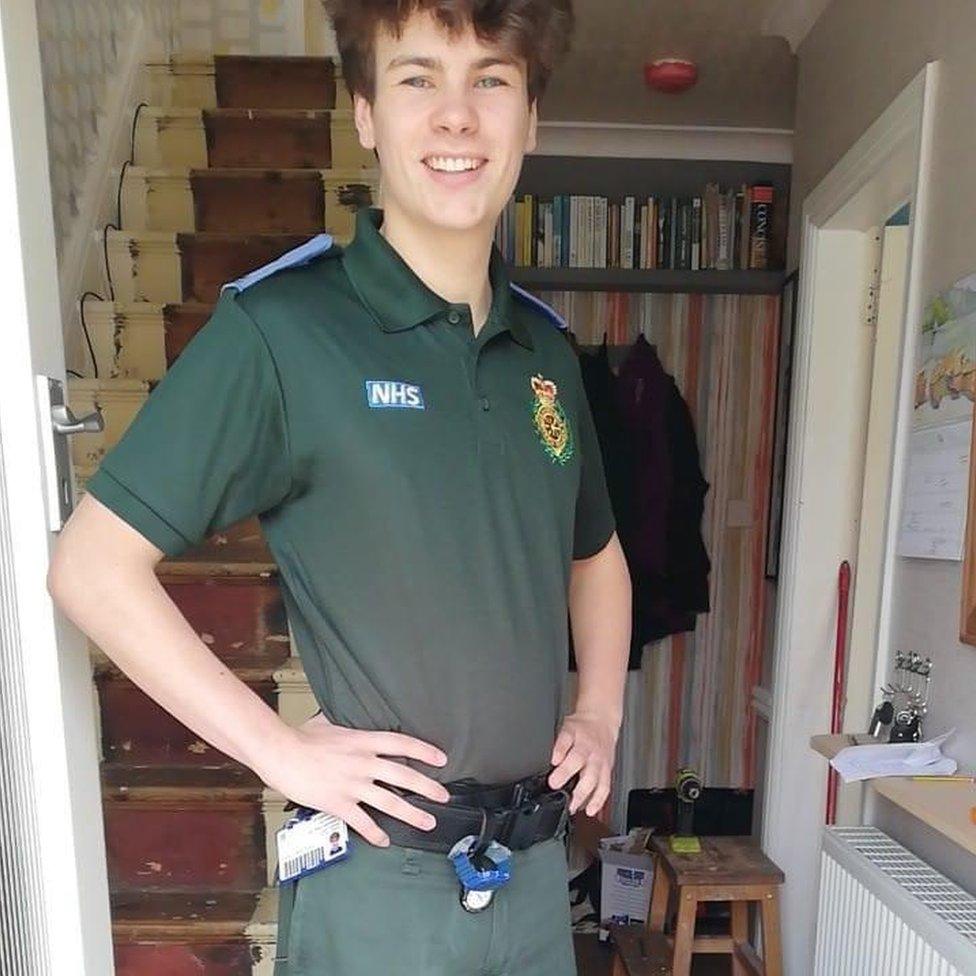Coronavirus doctor's diary: Will universities be able to avoid spreading the virus?
- Published

Students may not be spending a lot of time in lecture halls this year

A great migration is under way. Children have returned to school and students are beginning to leave for university. Will the UK be able to avoid the outbreaks experienced at some US universities, asks Dr John Wright of Bradford Royal Infirmary.
In the hospital we continue to see small numbers of patients with Covid-19. We walk a tightrope of preparing for the autumn surge while trying to get all our normal clinical care waiting lists back to pre-pandemic levels. The lull in acute cases provides a tense truce. In the empty visitors' car parks discarded facemasks are the new tumbleweed.
Meanwhile in the city the fever is rising. Every day the coronavirus needle flickers upwards; it's tempting to tap the dial in the hope that is just a malfunction. By Friday the incidence rate has crept up towards 80 per 100,000 and the case positivity rate towards 8%, from less than 50 per 100,000 and 5% just two weeks ago.
And this is happening in the middle of the largest population movement seen since the start of the pandemic in March. Last week eight million children and young people returned cautiously to school - it will be a couple of weeks before we have an accurate picture of how many outbreaks are occurring in the classroom.
Universities will be next over the trenches. Next week about two million students will start back at university - young people with some of the highest rates of Covid-19, and they will come from all over the country to congregate in large numbers in university cities and campuses. They will both give and take SARS-CoV-2.
In the US, where students went back after their summer vacation last month, this has caused serious problems. The New York Times has counted tens of thousands of new cases at colleges and universities in the last few weeks, external.

There are expected to be fewer international students discovering Bronte country this year
So how has the University of Bradford been preparing for the start of term?
Vice Chancellor Prof Shirley Congdon tells me about 60% or 70% of the curriculum will be taught online, the rest will be face-to-face. Where students need to assemble, for laboratory work for example, an attempt will be made to keep them in small bubbles - though as the vice chancellor points out, different students choose different modules, so bubbles will inevitably overlap.
Freshers' week is going to look very different this year, and not just because of the masks, thermometers and guidance pamphlets that each new student will receive in a welcome pack.
"The Students' Union is working with us to do activities where we can have groups where 20 or 30 students maximum experience a campus activity. And then that will be repeated again at a different time of the day or week," Shirley Congdon says.
But when it comes to socialising, she accepts that students are going to do their own thing.
"We don't want to enforce a police state, nor could we," she says. "So what we're trying to do with students and our staff is really create a big community that understands the importance of following social distancing, making sure that we all understand the risks."
The university is ready for test and trace, following guidance from Public Health England. It would be great if the university could carry out tests itself, Shirley Congdon says, "but that's not been offered to us yet".

Front line diary

Prof John Wright, a doctor and epidemiologist, is head of the Bradford Institute for Health Research, and a veteran of cholera, HIV and Ebola epidemics in sub-Saharan Africa. He is writing this diary for BBC News and recording from the hospital wards for BBC Radio.
Listen to the next episode of The NHS Front Line on BBC Sounds or the BBC World Service
Or read the previous online diary entry: The 'moonshine weddings' breaking Bradford's lockdown

As many of the positive cases now being detected are among young people with mild or no symptoms, the eyes of the nation are glaring down at them as they revel in the joy and freedom of youth.
It seems unfair to blame them, though, when we are giving out such mixed messages. Go to the pub, eat out to help out, go to university. But keep your distance, don't mingle, stay home when you can.
Mark Mon-Williams, a professor of psychology at the University of Leeds and the Bradford Institute of Health Research, makes the point that it's unrealistic to expect young people not to socialise, and that this is a time when it's important for their personal development to meet new people.
"So I think we really should think seriously about how we can support young people to have those social interactions, while maintaining the overall safety of the population," he says.
In his view, viral transmission on campus, under the new teaching regimes that have been introduced at British universities, is likely to be less of a problem than in student accommodation. In the US, according to an editorial in the British Medical Journal, asymptomatic students infected one another "at lightning speed, external" in halls of residence and off-campus housing. A fellow psychologist at Indiana University in the US tells Prof Mon-Williams that all teaching has now gone online, the campus is deserted and that some fraternities and sororities (male and female societies with their own residential buildings) have infection rates of 80%.
Like most other northern universities, the University of Bradford stands proudly at the heart of the city, surrounded by inner city wards. It is in these wards that we are seeing by far the highest levels of positive SARS-CoV-2 test results, and in these wards where most of the student accommodation lies waiting - bare walls waiting to be decorated with student posters, silent corridors waiting to be filled with laughter and late-night conversations that will put the world to rights.
Ethan Chapman, 19, who is returning to Bradford from his home in Lancaster for the second year of a course in Paramedic Science, says it's difficult to predict how the pandemic will affect his course and his social life.

"In relation to parties, the school leavers will miss an opportunity," he thinks. "It's hard to know if people will still party, especially with Bradford being such a hotspot."
He expects students will be urged to stay within the bubbles that they find themselves in, through sharing kitchens and bathrooms in halls, or shared houses. But some people won't enjoy having their social life curtailed in this way, he predicts, and will want to socialise with a wider group.
Though he was pulled off a placement working with qualified paramedics at the start of the pandemic, he is expecting to be equipped with a fitted mask and other PPE, and for placements this year to go ahead.
An added challenge in Bradford is that many students - about half of the total - live at home, with the consequent risk that they will carry the virus to older and more vulnerable family members.

Studying away

In Britain, in the academic year 2017-18, just over 80% of full-time students left home to study, external - roughly half living in purpose-built halls and the rest in private rented accommodation
In 2015/6 the University of Bradford was one of 10 British universities, external where more than 50% of students lived at home
On average in Europe, 36% of students live in their parental home

There are also students such as Marium Zumeer, whom I wrote about in May after her recovery from Covid-19, who has a place at Leeds Beckett university, and will continue living at home in Bradford if she decides to accept it. Her sister, Hana. is already at the same university.
Marium knows only too well how serious this illness can be, having been very ill herself, and having lost her grandfather, Mohammed, in the pandemic.

Hana and Marium
She wears a mask, she carries hand sanitiser, and whenever she returns home she changes her clothes.
"University is about meeting new people, socialising and making friends and joining groups, though when meeting new people you don't know if they've got the virus. It will worry me a bit," she says.
"I chose a university that's close to home because I prefer staying at home, that's just a personal choice, but for those who are living at home they have to be more mature about staying safe."
Follow @docjohnwright, external and radio producer @SueM1tchell, external on Twitter